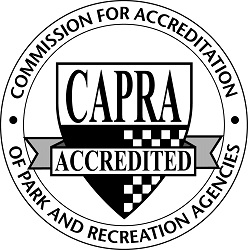Whether you are a new professional to the field of parks and recreation or a seasoned veteran, you have probably heard of CAPRA. But what exactly is CAPRA and what does it mean for you and your department?
 CAPRA stands for the Commission for Accreditation of Park and Recreation Agencies and in 2014 celebrates 20 years of accredited park and recreation agencies. It is the only national accreditation of park and recreation agencies, and is a valuable measure of an agency’s overall quality of operation, management and service to the community. CAPRA Accreditation demonstrates that an agency is in compliance with national standards of excellence.
CAPRA stands for the Commission for Accreditation of Park and Recreation Agencies and in 2014 celebrates 20 years of accredited park and recreation agencies. It is the only national accreditation of park and recreation agencies, and is a valuable measure of an agency’s overall quality of operation, management and service to the community. CAPRA Accreditation demonstrates that an agency is in compliance with national standards of excellence.
The standards are comprised of 10 categories that cover 151 standards. To achieve accreditation an agency must comply with the 37 Fundamental Standards and at least 85 percent of the remaining 114 standards.
The standards have gone through revisions, with the most recent 5th Edition revision made this year. The original set of standards was created in 1993, with the first agency accreditations coming in 1994. Since then, agencies throughout the country have seen the numerous benefits of accreditation.
I think it is safe to say that we would all like to be a part of a nationally recognized department for the services we provide for our community. Accreditation is the process through which we can achieve this.
There seems to be a few common questions that come up about CAPRA, so I recently spoke with Dirk Richwine, CPRE, AFO, a CAPRA Commissioner, to help provide answers.
1.What recommendations would you give a park and recreation department that is seeking accreditation?
Dirk believes it is vital to start the process by talking to other professionals who have gone through accreditation. He said:
“CAPRA Accredited agencies have always been willing to help agencies that are beginning to go through the accreditation process. This is a fantastic resource that too many agencies don't take advantage of. Talking and/or visiting accredited agencies is a great resource that will provide tremendous insight and information about the process.”
What’s great is that NRPA shows a current list of each and every department that is accredited you can review to identify an agency near you to reach out to and talk with.
2.Why has accreditation experienced such a rapid growth?
More and more departments see the value and benefits accreditation can bring for communities, both internally and externally.
Richwine believes this is because “it [accreditation] is comprehensive, and it offers agencies (regardless of their size or budget) a great opportunity to develop a solid administrative and managerial platform.” He also added that, “it helps establish legitimacy and credibility with each agency.”
As more agencies go through the process and become accredited, it gives others a sense of motivation and realization that they can do the same thing. While the process is not easy, it is manageable. Nearly any agency can become accredited.
3.What are some of the benefits of CAPRA Accreditation?
There are countless benefits of accreditation for both your department and also for your community.
For the community, pursuing and gaining accreditation shows your residents that the agency is meeting the national standards to deliver the best services to the community. It also holds the agency accountable to consistently meet the standards for at least five years. Accreditation can reinforce to the public the important role park and recreation agencies and professionals play in the community.
As for the agency, accreditation can enhance overall staff morale and foster teamwork, especially during the accreditation process. This process is often a great opportunity for staff to further their education on the park and recreation industry and gain a better understanding of assessing the past and measuring the future. Accreditation can also help staff learn more about other areas of the department and the related standards. For example, a program staff member can assist with the programming aspects of the accreditation process, but can also benefit by being on the overall accreditation team during which they will be exposed to the standards for planning or human resources.
4.How do I learn more about what it takes to get accredited?
NRPA and CAPRA have created several training opportunities on both the accreditation process and the standards. Live online chats are often held as well as in-person workshops in conjunction with NRPA’s Annual Conference. Another great opportunity to learn more is by becoming a CAPRA visitor. A visitor gets a firsthand view of the process of agency accreditation.
What benefits have you seen from CAPRA Accreditation? What other questions do you have about accreditation? Leave a comment or tweet us @NRPA_News.
Jay Tryon, CPRP, is the assistant director of parks and recreation for the Town of Indian Trail in North Carolina.

